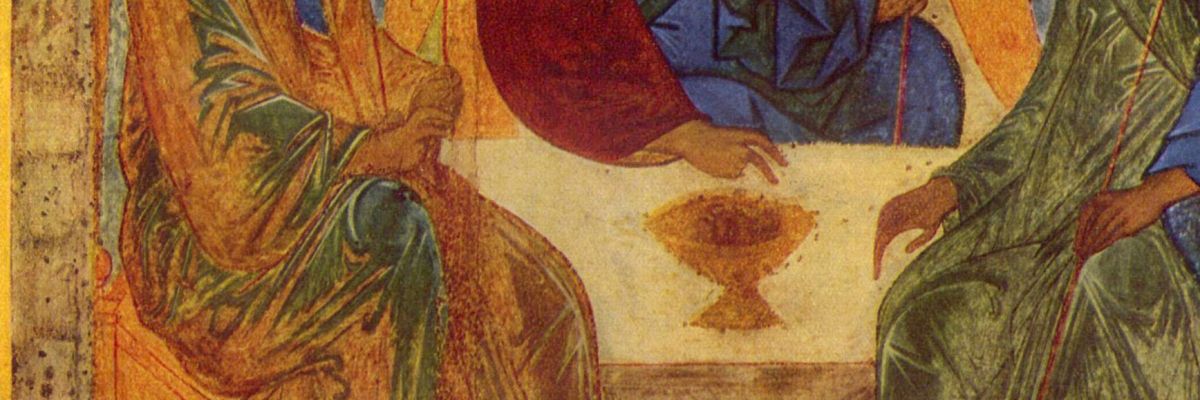
Homily for the Third Sunday of Easter, Year C
When they had finished breakfast, Jesus said to Simon Peter,
“Simon, son of John, do you love me more than these?”
Simon Peter answered him, “Yes, Lord, you know that I love you.”
Jesus said to him, “Feed my lambs.”
He then said to Simon Peter a second time,
“Simon, son of John, do you love me?”
Simon Peter answered him, “Yes, Lord, you know that I love you.”
Jesus said to him, “Tend my sheep.”
Jesus said to him the third time,
“Simon, son of John, do you love me?”
Peter was distressed that Jesus had said to him a third time,
“Do you love me?” and he said to him,
“Lord, you know everything; you know that I love you.”
Jesus said to him, “Feed my sheep.
Amen, amen, I say to you, when you were younger,
you used to dress yourself and go where you wanted;
but when you grow old, you will stretch out your hands,
and someone else will dress you
and lead you where you do not want to go.”
He said this signifying by what kind of death he would glorify God.And when he had said this, he said to him, “Follow me.”
-John 21:15-19
On the shore of the Sea of Galilee there is a unremarkable little church built over the place of the Gospel scene we read today. The altar of the church, called the “Church of the Primacy,” stands on the fairly large outcropping of rock by the sea on which Our Savior cooked and served breakfast to his disciples and on which they reclined and had the marvelous dialogue of Peter’s threefold profession of love and the Lord’s threefold conferral of the primacy.
In St. Matthew’s Gospel, we read of Peter’s commission as a reward for his profession of faith. Here, after the passion and resurrection of Jesus, this commission is the effect of his profession of love. The rock here is not only that of Peter’s faith, but the foundation of his love.
Notice the context and the tone of this grand conveying of the Primacy of Peter and his successors over the Church on earth. Our Lord demonstrates his own perfect idea of the brotherly love that is his new commandment. This is the love of service, which consists of concrete, practical deeds focused on the needs of our brethren.
Jesus appears, builds the fire, and grills the fish he had cleaned and prepared with the flatbread that always accompanied it (local tradition in Galilee claims the fish was a kind of tilapia!). He invites the brothers and then serves them, while engaging them in a very encouraging and edifying conversation. There we have it: along with our orthodox creed we also must have generosity, kind manners, and loving talk.
It is in the context of these that great spiritual gifts are conveyed. The Gospels, leading up to the Last Supper, are so full of references to the Savior’s taking meals with others that we are left with the impression that these meals, whether simple repasts or fine banquets, were the usual context of Our Lord’s ministry. Yes, he preached, but after preaching he went to dinner (or breakfast!)
It could be said that hospitality is the means whereby the gifts of grace are bestowed. After all, what is the Holy Mass but the supreme example of the generosity, careful manners, and loving speech turned into the very sacrifice of our eternal salvation at the table of the Lord?
There are two things that should characterize our practice of our faith and love. First we should focus on inviting others and joining them in eucharistic worship, whether at Mass or adoration. Second, we should make common meals in our families and hospitality to our friends the natural foundation of this worship. If we take the trouble to see that our families go to Holy Mass, we should also share our Sunday dinner with them. How often do we go to Mass, but also how often do we eat meals together?
This is a simple and daily thing, the taking of food, but it is far more important in our Christian life and formation than we may realize. In our culture today, entertaining guests and eating together as a family may be neglected. We have so many activities and differing schedules, after all. All the more reason, though, that we should make the effort to promote common meals and conversation. It goes without saying that this excludes our smartphones from the table!
My mother always used to say, “People do what they want to do.” If we do not give a certain priority to meals and conversation together, this means that we practically judge other things more important. But what is more important than our mutual service and time together? There is little in this life more beautiful than family and friends waiting on each other and speaking with each other at the table. It could even be said that this is the place that our Christian culture is experienced and passed on. It is easy to believe in the love we have for each other if we see it in action day in and day out at the table and in words of mutual edification, encouragement, and pardon, and we will begin to understand the majesty and power of our life together.
This majesty and power are exercised at Holy Mass, which brings us into the very life of the Holy Trinity. The famous icon by Blessed Andrei Rublev shows the Holy Trinity in the form of the three angelic visitors to Abraham and Sarah in Genesis. There they sit at table, ready to share a common meal. This is perhaps the most venerable and profound of images of the Trinity. Does not the Lord describe the kingdom of heaven as a wedding banquet?
We will be ready to enter into that great day if we have prepared for it often in this life, by following the example of the Lord in our natural and supernatural meals. So plan on this, invite often, and you and others will begin to feel the effect of so great a love, the rock foundation on which our Church, the Church of Peter’s faith and love, is built.



